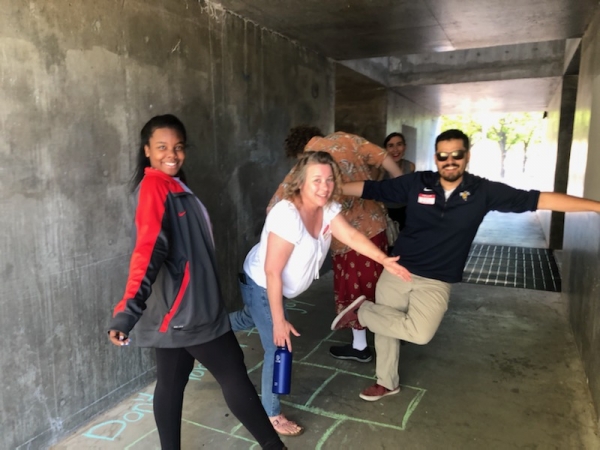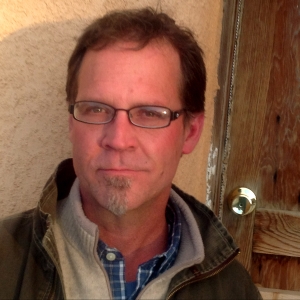Luther House Students Host Earth Day Scavenger Hunt
 Location 2– Educate/Organize: Smith Plaza- Advertised the “Youth vs. Gov” film screening and film discussion.
Location 2– Educate/Organize: Smith Plaza- Advertised the “Youth vs. Gov” film screening and film discussion. Location 2– Educate/Organize: Smith Plaza- Advertised the “Youth vs. Gov” film screening and film discussion.
Location 2– Educate/Organize: Smith Plaza- Advertised the “Youth vs. Gov” film screening and film discussion.By Todd Wynward
former board member of New Mexico El Paso Interfaith Power & Light
 Starting April 10, I’m joining a diverse band of people to walk part of a month-long, 300 mile water walk along the Rio Grande watershed–from Santa Fe to its headwaters outside of Creede, Colorado.
Starting April 10, I’m joining a diverse band of people to walk part of a month-long, 300 mile water walk along the Rio Grande watershed–from Santa Fe to its headwaters outside of Creede, Colorado.
This month-long pilgrimage is dedicated to securing “rights of nature” and legal personhood for the Rio Grande Gorge watershed and its tributaries.
I’m disrupting my “business as usual” to join a wildly diverse group of other water walkers because of the seriousness—and the sacredness—of our historical moment. If we humans do not treat the Rio Grande as kin—as a precious member of our interdependent community with her own legal protection—then we are going to lose her to extraction, pollution, exploitation and our own short-term thinking. If we keep treating the Rio Grande watershed simply like a resource to control, purchase, and diminish, you and I both know that she won’t be here to nourish and support our children and our children’s children and all the life that teems in this precious watershed we call home.
We are a diverse group of nonprofits, activists, citizens, students, educators, artists and religious groups seeking legal personhood and Rights of Nature for the Rio Grande and its tributaries. Our mission is to create change in the legal system so that these rivers are treated as vital and protected members of our society. Throughout time people have seen nature as part of their communities deserving of respect, rights, and well-being. It is time we re-learn and restore this right relationship between human society and the Rio Grande. It is time we change our hearts, our habits, our laws and our economies. It is time that our local, state and national governments adopt this same reverence for the Rio and its tributaries, leading to a healthy future for our bioregion and our species. It is time.
Would you like to get on board with the Rio Grande Water Walk yourself? I hope so! We need all of us to make the change. Here are seven ways to do so:
From Santa Fe to Taos, this Rio Grande Water Walk is walking alongside the Global Peace Walk, which has done so for 27 years. Come and join our great confluence!
Walk for the Water.
Walk for the Rivers.
Walk for our Future.
Walk for Peace.
The Shalom Center and partner organizations invite you to a virtual “Iftar-Seder,” a gathering to eat and think together about our shared future in America. It will happen, by Zoom, from 7:30 to 9:30 Eastern time (4:30 to 6:30 Pacific) on the evening of Sunday, April 10. The Iftar-Seder is free. We welcome you to join with us, by registering here
After you register, the organizing committee will email you additional information about the event, including a Zoom link and the program outline. Stay tuned for that email as we continue to finalize the program!

This year, we celebrate the Iftar and the Seder together, to celebrate each other and to beckon toward a future in which American Muslims and American Jews can work and pray with each other and with all the world — free of Islamophobia, Antisemitism, and racism; free from threats to democracy as a whole; free from lethal threats to our Mother Earth, our shared and nurturing home; and free to grow beyond our own spiritual “stuck places” as individuals and communities. Those four liberations will be connected in our Iftar-Seder with four cups (of grape juice) that shape a traditional Seder.
We had originally hoped that the COVID-19 virus would have become so minor by April 10 that we could safely eat together in Masjidullah, a mostly African-American Philadelphia mosque with strong outreach and commitment to liberation and justice, and a space for hundreds. (That was where we held the 50th-anniversary Freedom Seder.) But our planning committee felt that the virus is still too dangerous for a meal of hundreds together. So we will gather by Zoom.
We chose to do this because this Spring, the Jewish lunar “moonth” of Nisan — the first of months, according to Torah, and the bearer of the sacred eight-day festival of Pesach, Passover, will be the same moonth as the sacred Muslim “moonth” of Ramadan. In both traditions, there is a strong tradition of a special way of eating during the sacred season. For Muslims, it is a month of fasting to focus on God, made possible by eating a special dinner called Iftar each evening after sunset. For Jews, it is “Fasting” from all foods that contain even a smidgin of leavening — especially ordinary bread –and holding a special meal — the Seder –of symbolic foods and of Telling the story of liberation.
Originally, that was the story of liberation from the “NarrowPlace,” a country most Americans call Egypt where ancient Israelites had been enslaved by ancient Pharaohs.. Since the advent of the Freedom Seder in 1969, the Telling of liberation has broadened to include other struggles for freedom.
This event is being co-organized and sponsored by the following institutions:
– The Shalom Center
– Sisterhood of Salaam-Shalom
– Masjidullah
– CAIR-Philadelphia
– Interfaith Peace Walk
P.O. Box 27162
Albuquerque, NM 87125
(505) 266-6966
